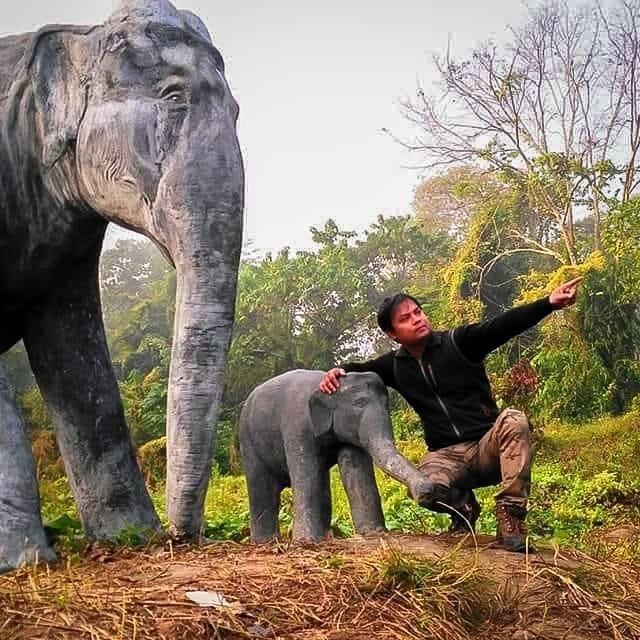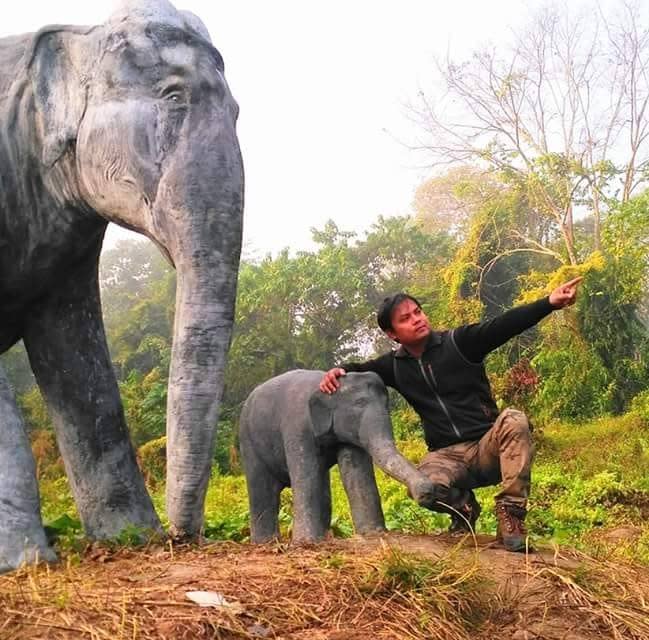 Listen to this article
•
15:34 min
Listen to this article
•
15:34 min
Over two decades ago, a seven-year-old Binod ‘Dulu’ Bora dreamt he was playing with an elephant calf. They were chasing each other, when suddenly the calf fell into a large hole and started screaming for help. Bora woke up with a start. The next morning, he insisted that an elephant somewhere was in need of help and forced his father to take him around the village. “It felt like the elephant was trying to send me a message that night. I had to rescue it!” he says. Sure enough, a few kilometres away, a calf was stuck in a ditch, and with the help of the villagers and local authorities, it was rescued. The incident, says Bora, changed him. “My connection with the wild is not ordinary,” he tries to convince me, eagerly.

We are sitting in a coffee shop in a mall in Guwahati, Assam, far away from the forests of Karbi Anglong, that he has grown up in and now helps protect. At 36, Bora has rescued over 2,500 animals including leopard cubs, turtles, monkeys, geckos, and hundreds of snakes. He is also a member of Green Guard Nature Organisation, an Assam-based grassroots non-profit that believes in involving local communities in conservation. Here, Bora leads the human-elephant conflict project. But along the hills of Karbi Anglong, Bora is fondly known as ‘elephant man’ or the 24X7 animal rescue helpline. Call Bora in the middle of the night with an animal emergency, and he will hop on his bike and turn up. Unlike most emergency operations that focus on containing the crisis, Bora’s rescues are often followed by long conversations over chai with the local communities, trying to answer difficult questions and dispel myths about animals.
As a child, Bora was a little bit of a daredevil. Along with his elder brother, he’d steal petty cash from the house to buy caged birds from the local market and set them free. He’d watch television shows on National Geographic and Discovery channels, and attempt catching snakes with his bare hands. As a teenager, he’d escort curious journalists to illegal stone quarries that were destroying precious forests near his home, only to be chased by
a livid mob. “I once had to hide under my mother’s bed and she had to beg them to spare my life,” he says.
Today, Bora realises that rescuing animals is not enough. One must address the anxiety that comes after every act of conflict. Karbi Anglong is the largest district in Assam, and adjacent to Kaziranga National Park. Seventy-seven per cent of the district is under forest cover, but unchecked development and encroachment has led to the destruction and fragmentation of the jungle. Resorts, tea plantations, and busy roads slice through the pachyderm’s regular routes, destroying fruiting trees that elephants feed on, pushing many to turn up in farms in search of food. Elephants ravaging crop fields and villages is becoming increasingly common. According to figures released by the Assam government in February 2019, since 2010, 761 people and 249 elephants have lost their lives. “How do you talk about elephant conservation to a village ravaged by an elephant?” asks Bora. When Bora hears of an incident of an elephant ravaging a farm he turns up with bread, a can of piping hot tea, and kerosene. Very often elephants attack granaries and homes where grain is stored. The first thing Bora does when he turns up is gather people and serve tea and bread. Then, he fills every lamp in the village with kerosene. “I understand what it is like to lose everything you have toiled for,” says Bora. “So if you have food to eat, and kerosene to light your village for the next few days, your anger towards the elephant may just reduce a little bit.” He makes repeated visits, teaches them easy tricks to keep the elephants away, and gradually talks about how the elephant’s food has reduced, and the only way to keep them away long-term is to let them feed in the forests. The villagers, after over a decade of intensive work, have now come to trust Bora. “We have lived in harmony with the elephants for years. I am just trying to remind them,” says Bora.

Bora with the support of Green Guards has started reviving old, forgotten rituals, such as the practice of ‘Hasthibhog’. When he was a child, his family worshipped elephant bones, and set aside some of their own food as an offering to the elephants. The practice was an acknowledgment of their shared world. The tradition of ‘Hasthibhog’ has lost prominence as destruction of forests has pitted elephant and human against each other. When an elephant dies, Bora turns up to offer a shradh or a ceremonial burial to the elephant, so the village empathises with the loss of life, instead of celebrating the death of another elephant. “We need to understand that people who live in and around forests already share a deep, intimate relationship with it — the forest is a part of their everyday practices, and rituals,” argues Rituraj Phukan, secretary general of Green Guard Nature Organisation, who supports and guides Bora on his missions. “They are also its best guardians.”

Green Guard’s conservation strategy is simple. All Bora tells people is that if the elephant has enough to eat it won’t come to your farms. In 2013, Bora started planting banana, jackfruit, and elephant apple trees in forests destroyed by growth of invasive plants, or by cultivation, in an effort restore the elephant’s food resources. “People thought we were crazy when we started this,” says Phukan. Green Guard now organises regular plantation drives around villages under its Haatibagan Community Forest Programme, where a village works towards regenerating a forest near its neighbourhood. The initiative is radical step away from state-led initiatives such as building electric fences around villages to keep elephants away. Over the years, Phukan claims, elephants have started frequenting these groves, and their visits to neighbouring villages have reduced considerably. At a recent event, over 600 people from affected villages followed Bora into the forest to plant fruiting trees for the elephants. “What made me happiest was to see that they were saving seeds for this plantation for several months,” says Bora. “It shows that love for the animal is not dead.” Though building an entire forest seems like a daunting task, Bora says that you just have to begin the process, and the elephants take over. “Elephants are called gardeners of the forest for a reason — they disperse seeds, and fertilise the soil with their dung. If you grow a sapling, you are planting a grove,” he says. “Elephants are intelligent creatures, and they are also kind and generous. We can coexist in perfect harmony, if we stopped taking away what is rightfully theirs.”






